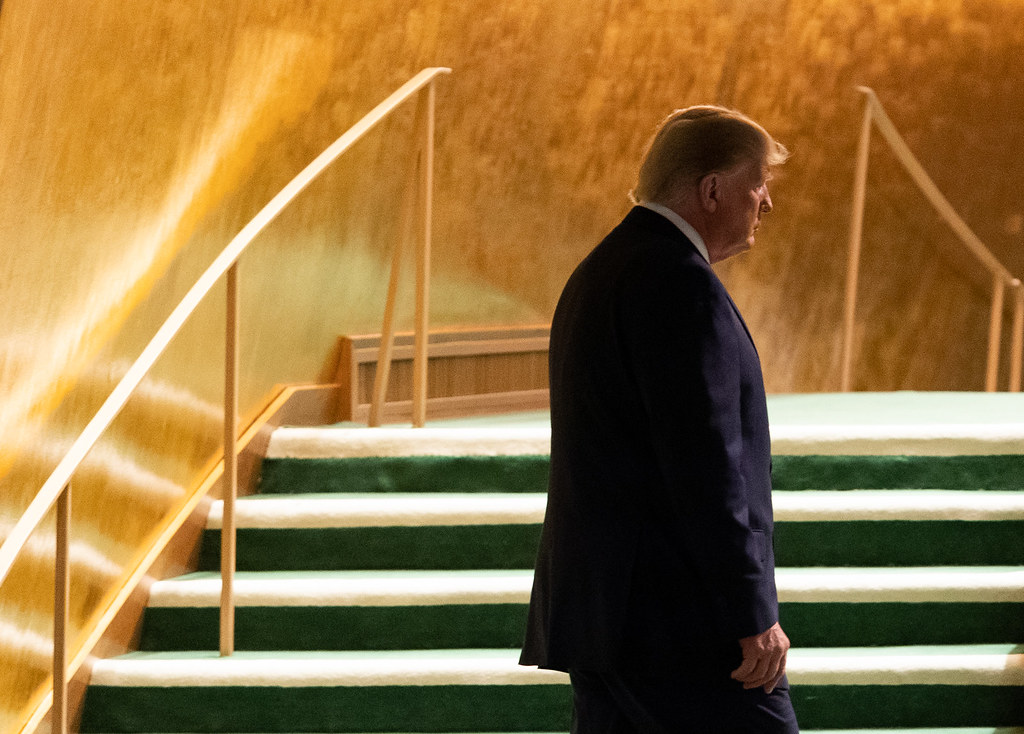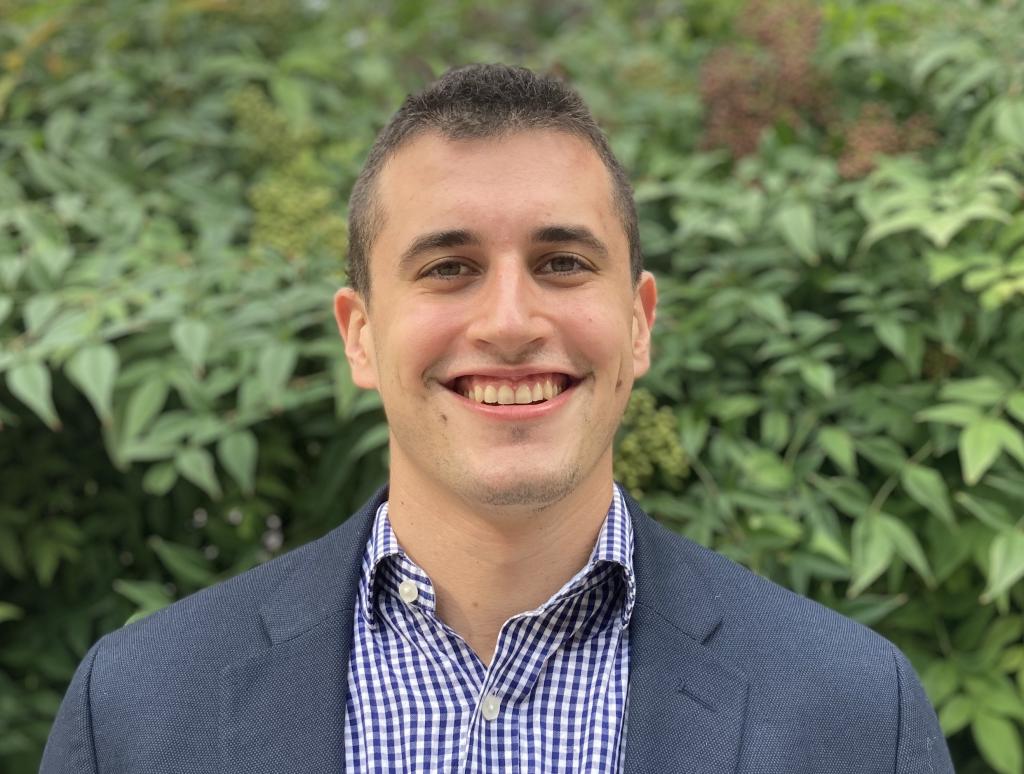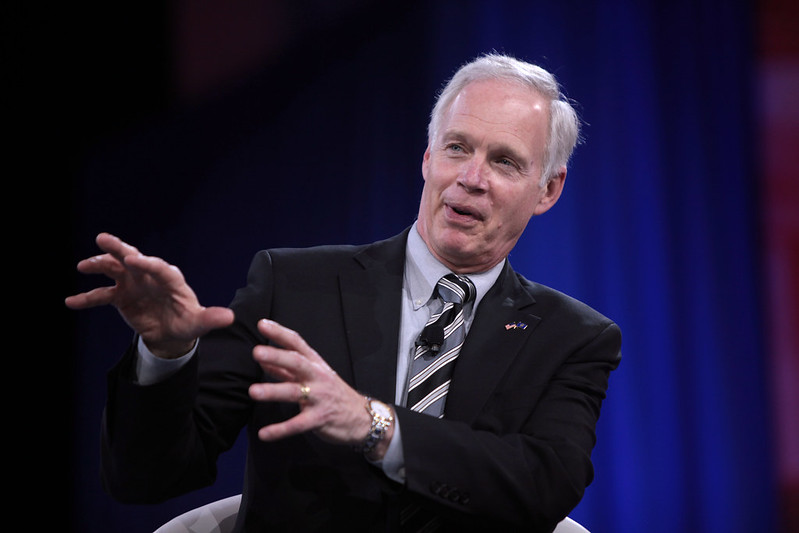Self-Impeaching: On the Trump-Zelensky Conversation
The misconduct cannot be dismissed as unproven; it screams off the plain text of the White House’s own memorandum detailing the president’s phone conversation with his Ukrainian counterpart.

Published by The Lawfare Institute
in Cooperation With

This time it’s different.
The misconduct cannot be dismissed as unproven; it screams off the plain text of the White House’s own memorandum detailing the president’s phone conversation with his Ukrainian counterpart. It cannot be disparaged as the result of a “Witch Hunt” or blamed on angry Democrats working for a special counsel or attempting a coup from the depths of the “Deep State.” The revelation did not flow from any investigation at all but, instead, from the complaints of shocked subordinates, complaints that generated pressure that ultimately caused the president himself to fess up and release the document. It cannot be blamed on “The Squad” or on Nancy Pelosi or on Adam Schiff. None of these people made the president say the words that appear in that document. None of them made him take the actions into which the memo offers dramatic visibility. Nor does the president deny that he said those words. He just thinks it’s fine for a president to do so.
And that, really, is the crux of the problem and the crux of the decision before Congress. To do nothing is to agree that this conduct is acceptable.
Before turning to what this document says, what it means and how we should collectively think about it, it’s important to emphasize that the memo does not represent the full scope of the still-emerging scandal that is L’Affaire Ukrainienne. For the past few weeks, the public has been looking at a complex scene through the narrowest of keyholes. That scene involves not just this one phone call but also Rudy Giuliani’s interactions with the Ukrainian government, machinations in the White House, the withholding of aid to Ukraine and presumably a bunch of other presidential actions. (Here is a timeline of the known events.) The release of this document does not completely fill out the picture. It dramatically fills out just one component of the picture. So keep in mind that we are still looking through a keyhole at the scene—just a keyhole whose aperture has suddenly widened and thus provided a clearer view of part of the hidden room. However bad the White House memorandum is—and it is very bad indeed—the full reality is almost certainly far worse.
The president is unrepentant. After the release of the memo, he tweeted:
Will the Democrats apologize after seeing what was said on the call with the Ukrainian President? They should, a perfect call - got them by surprise!
— Donald J. Trump (@realDonaldTrump) September 25, 2019
Over the course of the day since then, he has retweeted a steady stream of posts by political allies declaring that the memo is exonerating. He has asserted in two press conferences (one with Zelensky at the United Nations) that this—like the Mueller investigation—is a “Witch Hunt” and that he did nothing wrong. Meanwhile, talking points sent out by the White House focus instead on allegations of wrongdoing by Joe and Hunter Biden, arguing that Trump’s goal was to root out corruption in both Ukraine and the United States. Along with Trump’s allies in the press, the White House has also tried to paint Trump’s goal as enlisting Ukrainian assistance in probing Russia’s interference in the 2016 election.
We will leave it to others to predict whether these arguments will carry the day politically as Congress weighs the question of impeachment. During his press conference with Trump, Zelensky offered some support, stating that “nobody pushed me” to investigate Biden and emphatically asserting that Ukraine is an “independent country” with an “independent judiciary” over which he has no control.
But Serhiy Leshchenko, an adviser to Zelensky, told ABC that the Ukrainians understood discussion of the Biden issue as a precondition for scheduling a call with Trump: “It was clear that Trump will only have communications if they will discuss the Biden case,” said Leshchenko. “This issue was raised many times. I know that Ukrainian officials understood.”
For present purposes, it suffices to note that the text of the memo offers not a whiff of support for the president’s claims about what he did. That text unambiguously reflects conduct intolerable in a president in a number of different respects. And it does so in five brief, easy-to-understand pages, in which Trump clearly seeks to recruit a foreign head of state to violate the civil liberties of American citizens and uncover dirt on a potential political opponent in the 2020 presidential election. For everyone who breathed a sigh of relief that the Mueller report did not establish presidential “collusion” with Russia in 2016, the White House itself has announced with this release that the president himself has already engaged in such collusion with Ukraine for the next election cycle—and what’s more, he is putting the powers of the American presidency to that purpose.
Let’s start by parsing what the document says, though we urge readers to take the time to read it in full:
The conversation in question took place the morning of July 25, 2019—one day after former Special Counsel Robert Mueller’s testimony before the House Judiciary and Intelligence Committees regarding the results of his investigation. The relevant part of the conversation starts a few minutes in, after an exchange of pleasantries in which Trump congratulates Zelensky on his party’s recent win in Ukraine’s parliamentary elections. Trump moves from there to a discussion of the U.S.-Ukraine relationship, framing it in terms of reciprocity:
Trump: The United States has been very good to Ukraine. I wouldn’t say that it’s reciprocal necessarily because things are happening that are not good but the United States has been very very good to Ukraine.
After lauding the United States for its support for Ukraine, Zelensky shifts the conversation to business:
Zelensky: I would like to thank you for your great support in the area of defense. We are ready to continue to cooperate for the next steps specifically we are almost ready to buy more Javelins from the United States for defense purposes.
The “Javelins” that Zelensky is referring to are U.S. anti-tank missiles, a type of weapon that the Trump administration began providing to Ukraine along with other forms of lethal equipment in 2017. Just a few weeks before Trump and Zelensky spoke, Ukraine had put in a request to purchase additional arms and military equipment from the United States, which was still pending review by U.S. officials by the time of the call.
But Trump then pivots to a new topic (emphasis added):
Trump: I would like you to do us a favor though because our country has been through a lot and Ukraine knows a lot about it. I would like you to find out what happened with this whole situation with Ukraine, they say Crowdstrike… I guess you have one of your wealthy people… The server, they say Ukraine has it. There are a lot of things that went on, the whole situation. I think you’re surrounding yourself with some of the same people. I would like to have the Attorney General call you or your people and I would like you to get to the bottom of it. As you saw yesterday, that whole nonsense ended with a very poor performance by a man named Robert Mueller, an incompetent performance, but they say a lot of it started with Ukraine. Whatever you can do, it’s very important that you do it if that’s possible.
Here Trump appears to be referencing a peculiar conspiracy theory he’s echoed in the past, casting doubt on whether Russia was really responsible for the hack of the DNC server in the spring of 2016. Proponents of this theory argue that because the DNC server hacked by the Russian government in the lead-up to the 2016 election was never examined by the FBI but only by Crowdstrike, a private cybersecurity company hired by the DNC, its conclusions cannot be trusted. Trump has said in the past—incorrectly—that the company is owned by a Ukrainian national. Here, he appears to be asking for Zelensky’s help, and proposing enlisting Attorney General William Barr, to track down this server—which he seems to believe somehow ended up in Ukraine. (There is no evidence for this.)
Zelensky responds by emphasizing the importance of U.S.-Ukrainain cooperation and the broader strategic partnership, assuring Trump that the American president “ha[s] nobody but friends” in Zelensky’s administration. He mentions a recent meeting between one of his assistants and the president’s personal lawyer, Rudy Giuliani, noting that “we are hoping very much that Mr. Giuliani will be able to travel to Ukraine and we will meet once he comes to Ukraine,” before closing by assuring Trump that “all the investigations will be done openly and candidly.” Trump then uses this as an opportunity to pivot to another topic of particular concern:
Trump: Good because I heard you had a prosecutor who was very good and he was shut down and that’s really unfair. A lot of people are talking about that, the way they shut your very good prosecutor down and you had some very bad people involved.
The prosecutor in question is Viktor Shokin, the former Ukrainian prosecutor general. Shokin was removed from his position by Ukraine’s parliament in 2016, after the Obama administration threatened to withhold U.S. foreign assistance to the country over Shokin’s resistance to pursuing corruption prosecutions. This policy decision has played a central role in another series of theories Giuliani has advanced in recent months. Giuliani has posited that the Obama administration—and Vice President Joe Biden, in particular—lobbied for Shokin’s removal because he had opened an investigation into a Ukrainian gas company, Burisma Holdings, of which Biden’s son, Hunter Biden, was a board member. Subsequent reporting has shown that the investigation into Burisma was long dormant by this time and did not implicate the younger Biden, and one of Shokin’s successors cleared the Bidens of any suspicion of wrongdoing. Yet Trump and Giuliani have continued to circulate the theory anyway. For this reason, perhaps, Trump goes on to discuss another actor in the broader controversy:
Trump: The former ambassador from the United States, the woman, was bad news and the people she was dealing with in the Ukraine were bad news so I just want to let you know that.
The ambassador Trump is referencing is Marie Yovanovitch, a career foreign service officer who served as the U.S. ambassador in Kyiv from August 2016 through May 2019, when she was summarily dismissed just a few months prior to the end of her appointed term. Yovanovitch had become a target of criticism for Giuliani, who accused her of involvement in a conspiracy to expose information damaging to the Trump campaign in 2016.
Trump then turns to his request that Zelensky have the Ukrainian prosecutor general revisit the subject of the Bidens’ role in Shokin’s removal. Here and at multiple other points throughout the conversation, he references Barr, as well as Giuliani, as a point of contact for Zelensky on the matter. (The Justice Department has stated that Barr “has not communicated with Ukraine” or discussed the matter with Giuliani, and that Trump did not ask Barr to contact the Ukrainian government.):
Trump: The other thing. There’s a lot of talk about Biden’s son, that Biden stopped the prosecution and a lot of people want to find out about that so whatever you can do with the Attorney General would be great. Biden went around bragging that he stopped the prosecution so if you can look into it… It sounds horrible to me.
Zelensky responds by assuring Trump that he is appointing a new prosecutor who will “look into the situation.” Trump goes on:
Trump: I will have Mr. Giuliani give you a call and I am also going to have Attorney General Barr call and we will get to the bottom of it. I’m sure you will figure it out. I heard the prosecutor was treated very badly and he was a very fair prosecutor so good luck with everything.
After Zelensky promises Trump to that he will “take care of” the investigation, Trump comments that Yovanovitch is “going to go through some things.”
There’s a great deal more—including Zelensky’s apparent attempt to ingratiate himself with Trump by noting that he stayed at Trump Tower on his last visit to New York City. But by and large, this is the substance of the call that appears to have motivated the whistleblower complaint. It is also the substance that rightly has Congress’s attention.
Both the New York Times and the Washington Post have reported that the director of national intelligence and the intelligence community inspector general referred the complaint about Trump’s call with Zelensky to the Justice Department for possible criminal investigation. The director in question appears to have been Acting Director of National Intelligence Joseph Maguire. His predecessor, Dan Coats, left the role on Aug. 15 and has stated publicly that the whistleblower complaint was presented the day after his departure. According to the Post, the inspector general found that Trump’s pressuring of Zelensky could implicate campaign finance laws prohibiting the solicitation or acceptance of a “thing of value” from foreign nationals.
The Criminal Division of the Justice Department, however, reviewed the memo describing the Zelensky call and found that the facts did not supply an adequate predicate for a criminal investigation, the Justice Department has stated publicly. According to the Post, Assistant Attorney General Brian Benczkowski made the final decision. The department’s reasoning rests on the argument that an investigation by the Ukrainian government did not constitute a “thing of value” under the relevant statute, the Post writes.
If all this sounds familiar, it’s because it is: A key question considered by Robert Mueller involved whether Donald Trump Jr. and the leadership of the Trump campaign unlawfully solicited a thing of value from Russian individuals in seeking “dirt” on Hillary Clinton in the infamous Trump Tower meeting. In that instance, Mueller declined to bring charges in part because of the difficulty in ascertaining whether the promised dirt constituted a thing of value and, if it did constitute such a thing, what its valuation would be.
Campaign finance lawyers and other specialists will debate the adequacy of the Justice Department’s judgment in the Ukraine case, just as they did about Mueller’s declination decision. On today’s special edition of the Lawfare Podcast, campaign finance expert Bob Bauer argued that the Justice Department’s apparent analysis, to the extent that it’s public, is not persuasive. And former Justice Department official David Kris raised a number of other possible theories of criminal liability:
Whatever the merits of the criminal side of the picture, it is a sideshow. The far bigger question is the acceptability of the president’s conduct. As law professor Alan Rozenshtein put it earlier today: “The question is not whether Trump broke federal criminal law. The question is whether he has failed to uphold his constitutional duties and should be impeached and removed from office.”
In that regard, while the call provides no shortage of material to analyze, three main issues stand out regarding Trump’s conduct: the question of a possible quid pro quo; the clear evidence that the president solicited the Ukrainian president to deliver dirt on U.S. persons in a gross abuse of their civil liberties; and a just-as-clear attempt at soliciting foreign government intervention in a U.S. presidential campaign.
Trump and his supporters have aggressively asserted that the call does not contain evidence of a quid pro quo. But in context of the broader issue of U.S. military aid to Ukraine, the memo actually is suggestive of a kind of shakedown. Days before the call, Trump ordered his acting chief of staff, Mick Mulvaney, to freeze a substantial package of military aid to Ukraine—a move that reportedly baffled and concerned officials in both the State and Defense Departments. Now consider how Trump sets the stage for his conversation with Zelensky by framing the U.S.-Ukrainian relationship in terms of reciprocity, suggesting that “the United States has been very good to Ukraine” but Ukraine may not have adequately reciprocated.
Thus when Zelensky comes in with his ask—for the president’s support for Ukrainian efforts to acquire defensive equipment from the United States—Trump is ready. He immediately pivots to an ask of his own, telling Zelensky that “I would like you to do us a favor though[.]”
But the favor in question is not a policy favor for the United States. It’s a political favor for Trump. This is where Trump raises the issue of Crowdstrike, asking Zelensky to “find out what happened with this whole situation with Ukraine.” Recall that the conspiracy theory regarding Crowdstrike involves casting doubt on whether Russia really hacked the DNC and, thus, on whether Russia interfered in the 2016 election at all. Trump appears to be asking for Zelensky’s help in amplifying this theory—which supports Trump’s understanding of the Mueller probe as a “Witch Hunt”—and finding evidence to support it. His request for a “favor”—immediately after Zelensky references a prospective purchase—is easily understood as the president’s connecting the U.S.’s provision of defensive equipment to Zelinsky’s willingness to assist Barr on a matter of personal concern to the president.
When Zelensky responds positively, stating that “all the investigations will be done openly and candidly,” Trump digs in further with another request: “[W]hatever you can do with the Attorney General would be great,” he says, pushing Zelensky to commit to investigating Hunter Biden and Joe Biden. He requests repeatedly that Zelensky speak to Giuliani, who at this time was publicly calling for the Ukrainians to investigate the Bidens.
Here again, context is key. The president is invoking a debunked conspiracy theory about Hunter Biden, which—if successfully propagated—would weaken Joe Biden’s 2020 presidential candidacy.
So while the president and his supporters are correct that there is no explicit quid pro quo in the sense of a moment in which Trump says something like, “I will only give you those weapons you need if you help me with my reelection run,” the coercive context is not hard to infer from the text itself and the surrounding circumstances. A plain reading of the memo makes clear that the quid is funds for defense equipment and the quo is help from Zelensky in discrediting the Mueller investigation’s findings and Trump’s potential political opponent, Joe Biden. It may not be clear enough to satisfy the exacting standards of the criminal law. But remember, this is only one conversation in a long string of interactions, and Congress is not assessing whether the bribery or extortion statutes have been offended. It is assessing whether the president is fit to hold office.
Quid pro quo is actually not the sine qua non of impeachability in this conversation anyway. Even if there was no quid pro quo, or the evidence on the subject is unclear, there is no question that Trump explicitly requested that the government of Ukraine investigate Joe and Hunter Biden. This is the overt solicitation by the president of a foreign investigation into a political opponent—a serious offense in and of itself, whether Trump conditioned aid to Ukraine on the investigation or not.
The civil liberties and constitutional rights of American citizens are implicated every time the government initiates a law enforcement investigation. For this reason, when the government believes that a violation of U.S. law has taken place, laws and guidelines govern how law enforcement may proceed. The nature of the investigation—whether it is a criminal probe or a national security investigation—dictates the protections that must apply and the predicate thresholds that must be met. But in all cases, it is impermissible for the government to investigate someone simply for political purposes. To do so is to wield the coercive powers of the U.S. law enforcement apparatus to abuse a citizen’s rights.
If a domestic investigation into a U.S. citizen requires information from a foreign government, U.S. law enforcement has specific processes to request that information—including, but not limited to, agreements like mutual legal assistance treaties. This foreign law enforcement cooperation occurs within a framework designed to both share information and also respect the rights of the relevant parties within the respective jurisdictions of both governments. The inverse sometimes happens as well: Foreign governments will initiate investigations that require U.S. law enforcement cooperation and will make requests of the Department of Justice for information to be shared. Again, there are specific channels and processes that govern when and how such cooperation occurs.
But none of this took place here. There is no evidence that any U.S. law enforcement entity has investigated Biden or his son regarding corruption in Ukraine or made official requests to Ukraine along these lines. Instead, the president asked the president of Ukraine to wield his country’s law enforcement powers against these people. And he dispatched his personal attorney to help.
To be sure, presidents sometimes attempt to use their foreign policy authorities to encourage a foreign government to initiate its own law enforcement action. The U.S., for example, pressures Latin American countries to take action against narcotraffickers and pressures China to crack down on intellectual property theft. This type of pressure sometimes involves encouraging foreign partners to pursue legal actions against individuals whom U.S. officials believe have committed crimes but cannot themselves prosecute for jurisdictional or other, more pragmatic reasons. The paradigmatic example is encouraging the foreign prosecution of terrorism suspects, a practice that has played a major role in U.S. counterterrorist efforts since the Sept. 11 attacks. But the proper amount of pressure for the U.S. president to exert against a foreign government to investigate U.S. citizens for political purposes is zero. It should simply never happen.
And the context surrounding Trump’s requests regarding the Bidens shows it to be anything but policy driven. Unlike most such requests, this one was not the product of a deliberative interagency process aimed at arriving at a cohesive U.S. policy. To the contrary, reports indicate that officials on the National Security Council had grown concerned in recent months over the degree to which Trump and Giuliani have come to personally dominate Ukraine policy at the expense of other foreign policy officials. Nor was Trump’s request backed up by the sort of evidence or other information that one would expect in an effort to legitimate that foreign government’s legal action, especially as Ukrainian officials had previously cleared Hunter Biden of any wrongdoing.
Most importantly, however, requests for foreign law enforcement action almost always occur through conventional diplomatic and law enforcement channels, so that working-level officials can coordinate further on the details. These requests never involve referrals to private citizens with no diplomatic or law enforcement authority or responsibility—let alone, as in this case, the president’s personal attorney—in directly relevant legal action. The unavoidable inference is that the request being made has nothing to do with the national interests such actions are supposed to advance, and everything to do with the president’s own interests.
American citizens are entitled to certain constitutional rights, including the right to due process and the right not to be subject to law enforcement action because of their constitutionally protected political expression. When taking action that may compromise the private interests of a U.S. citizen, the federal government is required to weigh the risk that those private interests will be erroneously denied against the public interest being pursued and the burden that taking additional measures to reduce the risk of arbitrary deprivation would entail. A series of legal and regulatory restrictions help ensure that the government respects these rights within the United States, but the constitutional obligation to do so doesn’t go away overseas. Yet here, Trump appears to have taken an official act as president vetted by no particular process and without any clear public interest in mind, with the clear knowledge and intent that, if he had his way, his actions could lead to the investigation, prosecution and arrest of two American citizens. In other words, he appears to have acted without any regard for their constitutional due process rights—a set of rights that prior presidential administrations have been careful to at least consider even when detaining and targeting Americans overseas who are suspected of being terrorists hostile to the United States. The contrast with how this administration has approached its duties toward a former vice president and possible presidential candidate is striking.
The last major area of concern about this call involves the solicitation of foreign intervention in American electoral politics. Everyone who claimed the Mueller report vindicated the president because Mueller did not prove “collusion” with Russia needs to reckon seriously with what Trump asked of Zelensky. In L’Affaire Russe, the Russian state—at the direction of the Russian president himself—intervened in the American presidential election by a number of different means. The defense of Trump’s conduct, and that of his campaign, was that they were not involved in the Russian intervention. Even to the extent that people associated with the Trump campaign had contact with the Russians, it is not clear that Trump himself knew about the contacts. Here, by contrast, the request to a foreign government to involve itself in American electoral politics is as direct as can be. The president in this document is asking his counterpart to deliver the goods on a possible electoral opponent. And he is doing it himself. There is no plausible deniability. If this is not collusion in precisely the sense that collusion’s absence was purportedly so exculpatory in the Russia context, it’s hard to imagine what collusion would look like. And unlike the conduct described in Volume I of the Mueller report, the president is no longer a private citizen. Now, he is actually corruptly wielding the powers of his office in order to achieve this abusive end. This represents a dramatic escalation in severity.
Tomorrow, Maguire will testify before the House Intelligence Committee. He may face questions about the contents of the complaint, his interactions with the White House and the Department of Justice, as well as reports that he threatened resignation if he could not speak freely before the committee—reports that he later denied. The whistleblower complaint has been delivered to Congress, and members of both intelligence committees have reviewed it, so it’s likely that more details about its contents will emerge soon. Trump also stated that he is willing to release transcripts of both his and Zelenky’s first telephone conversation and the Ukrainian president’s meeting with Vice President Mike Pence. A great deal depends on how legislators react to the widening aperture and resulting increased visibility into the room.
It is important to remember that impeachment is a hybrid of a legal phenomenon and a political one. While it proceeds under a constitutionally defined legal standard, the adjudicator of that standard is Congress, not a prosecutor or a judge. The question of whether the president has committed “Treason, Bribery, and other high Crimes and Misdemeanors” involves the application of a legal and constitutional standard, but it’s a standard defined and articulated by political judgment. In the midst of the Clinton impeachment, Lindsey Graham—then a member of the House of Representatives—articulated it well: “You don’t even have to be convicted of a crime to lose your job in this constitutional republic if this body determines that your conduct as a public official is clearly out of bounds in your role…. Impeachment is not about punishment. Impeachment is about cleansing the office. Impeachment is about restoring honor and integrity to the office.”
The key question is thus how Congress’s collective judgment will change as the keyhole widens and we see more and more of the picture. After viewing the whistleblower complaint, Republican Sen. Ben Sasse of Nebraska said, “Republicans ought not to be rushing to circle the wagons to say there’s no there there when there’s obviously lots that’s very troubling there.” Does this suggest that confronting the stark reality of what Trump has done might spark a shift in opinion?
Another key question will be what timeline House Democrats envision for moving forward. On the one hand, the memo itself could form the basis for an article of impeachment, and moving expeditiously could allow Pelosi to take advantage of the political momentum in her caucus for impeachment. Democrats may choose to let matters ripen. This memo is just one piece of a larger puzzle of potentially impeachable conduct worthy of investigation—and further investigation may reveal even worse conduct. In the meantime, the president and his allies will launch an all-out effort to discredit the impeachment proceedings and normalize the president’s conduct. So there’s a race to frame public understanding of the conduct at issue, along with the investigation of that conduct.
And therein lies the rub. Using the office of the presidency of the United States to pressure the head of a foreign government to investigate a domestic political opponent ahead of an election is gross misconduct. It clearly corrupts the political and governmental process by threatening the independence of U.S. elections. But in the context of a president who is breaking a whole host of political and moral norms on a daily basis, how long does one keep investigating before one finally renders judgment and forces a vote?
The answer may be when the Speaker of the House can count the 218 votes necessary to pass articles of impeachment whose inevitability she seems suddenly to accept.









-final.png?sfvrsn=b70826ae_3)

